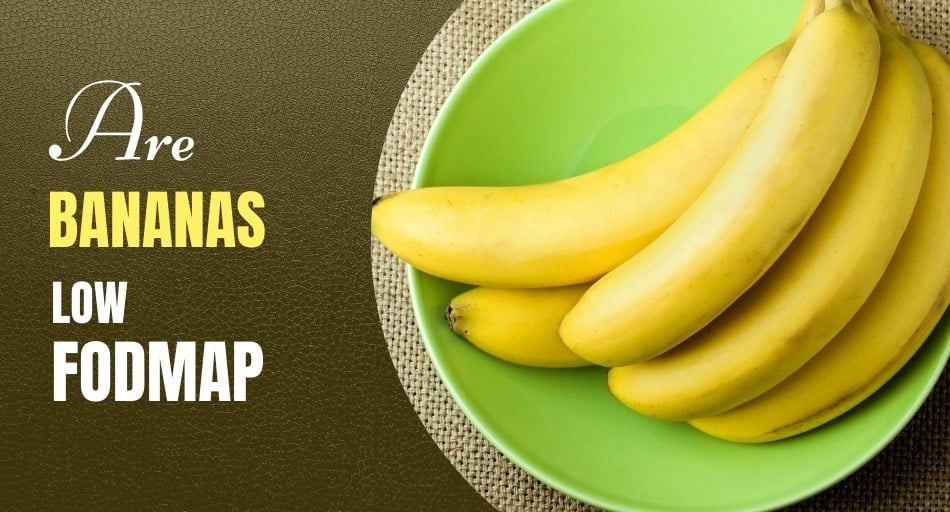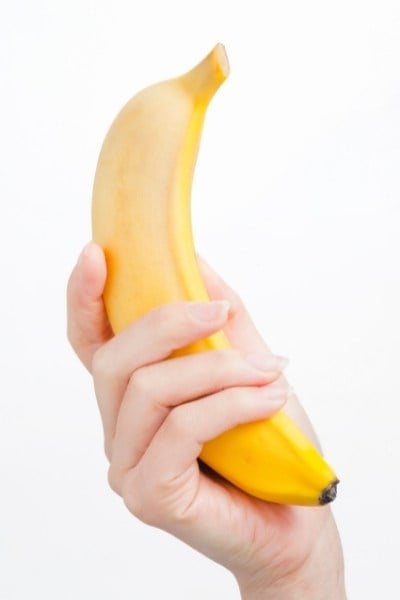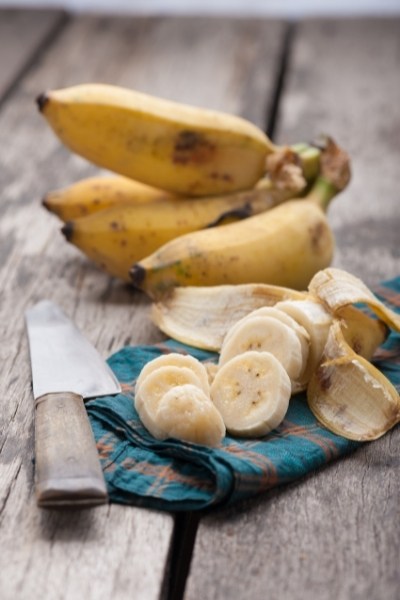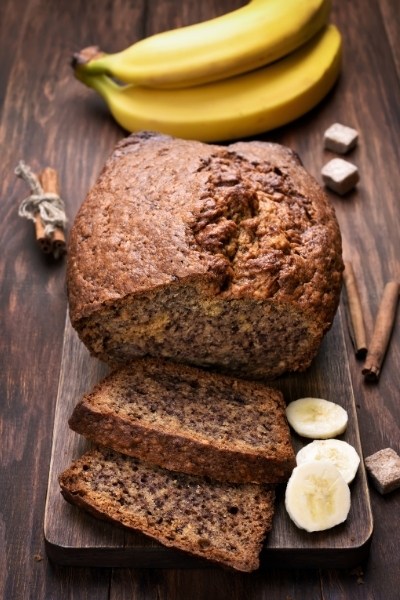Finding foods that fit a low FODMAP diet can be hard sometimes. Often, you either have to completely avoid certain foods or consume them in small quantities.

So, it doesn’t leave much room for variety in your diet.
Luckily, there are still many foods that can be a part of a low FODMAP diet. For example, many fruits, including bananas, are a great source of nutrients and good for your digestive system.
But are they low in FODMAPs? Or do they trigger IBS symptoms?
Table of Contents
Are bananas low FODMAP?
Whether you can eat bananas on a low FODMAP diet depends strongly on whether they’re ripe. The riper the banana, the more FODMAPs it contains. So, people with IBS should consume green, unripe bananas to avoid any side effects.
If you can tolerate small amounts of bananas, though, you can reap wonderful health benefits. Bananas are a rich source of several vitamins and minerals as well as antioxidants.

So, eating them can improve your health and reduce your risk of certain health conditions.
How high in FODMAPs are bananas?
Ripe bananas tend to be very high in FODMAPs. So, it’s best if you avoid them if your IBS symptoms are severe.
You can consume them in small amounts, but make sure to stick to a small serving of ⅓ of a banana in one sitting.
On the other hand, unripe, green bananas are much lower in FODMAPs. So, you can safely consume a whole medium-sized banana in one sitting on a low FODMAP diet.
Can you eat bananas on a low FODMAP diet?
Ripe bananas are high in FODMAPs, but they can still be consumed on a low FODMAP diet if you stick to a small serving.
For a ripe banana, it’s recommended to eat just ⅓ of the fruit in one sitting.
That way, you can still get the delicious flavor and nutrients but not too many FODMAPs.

When it comes to unripe, green bananas, you can safely eat the whole fruit in one sitting. This is because they are lower in the indigestible carbs, so they are unlikely to cause any digestive system issues.
But still, make sure to eat just one and don’t overdo it.
Is banana juice low in FODMAPs?
The canned and bottled banana juice is much higher in FODMAPs than fresh bananas. It also often contains added sugar, so it can be even worse for your digestive system.
In addition, most banana juices are made with very ripe bananas, which means they naturally contain indigestible carbs.
As a result, it might be best to limit your consumption of banana juice, especially if your IBS is severe.
On the other hand, experts say that you can make banana smoothies using green bananas and low-FODMAP almond milk.
That way, you can still indulge in bananas but not suffer any consequences after.
Is banana bread low in FODMAPs?

Store-bought banana bread is generally very high in FODMAPs as well as sugars. So, if you suffer from IBS or any other digestive system issue, it might be best to avoid it.
Luckily, there are many recipes online that allow you to make your own banana bread that’s not bad for your digestive tract.
They use slightly different ingredients that are lower in FODMAPs, so you can incorporate banana bread into a low FODMAP diet.
Are bananas good for you?
Just like in most other fruit, most calories in bananas come from carbs. While a lot of carbs in bananas are sugars, one medium banana also provides you with 3.1 g of fiber, which is 12% of your daily recommended need for this nutrient.
The fiber found in green, unripe bananas is mostly starch and resistant starch. This type of fiber is indigestible, which means that it improves blood sugar levels and helps food pass through your digestive tract.
Ripe bananas contain mostly soluble fiber, which dissolves during digestion and helps food pass through your intestines.
Together, these two types of fiber help prevent spikes in your blood sugar levels. So, if you suffer from diabetes, eating moderate amounts of bananas from time to time can help improve your symptoms.
Bananas are also an excellent source of vitamin B6, providing you with 22% of your daily need for this micronutrient in a single serving.

Vitamin B6 has been known to improve mood and reduce the symptoms of depression. It also promotes brain and cognitive health, lowering your risk of Alzheimer’s disease and other cognitive disorders.
Getting enough vitamin B6 each day can also prevent and treat anemia. This is because this vitamin works with iron to produce hemoglobin.
So, make sure to eat a lot of vitamin B6-rich foods.
In addition, bananas contain a great amount of potassium and are considered a potassium-rich fruit.
This mineral helps offset the negative effects of dietary sodium on your blood pressure, lowering it.
Potassium also ensures that your muscles and nerves function properly. It’s also crucial for maintaining a healthy and steady heart rhythm.
So, unless you have special dietary requirements when it comes to potassium, it’s important to load up on potassium-rich foods.
Just like other fruits, bananas are also full of powerful plant compounds and antioxidants. These substances help flush out free radicals and toxins from your body.
This prevents oxidative damage to your cells and lowers your risk of chronic conditions like heart disease, diabetes, and even cancer.
The same antioxidants also have anti-inflammatory properties, so they can lower your risk of chronic inflammation and other issues relating to that.
Conclusion
Bananas, especially the ripe ones, aren’t a great choice for people with IBS. Because of that, if you do want to consume them, you should stick to small servings or opt for green, unripe bananas to avoid any digestive problems.
If you can tolerate bananas, though, it’s beneficial to include them in your diet. They contain a lot of fiber, vitamin C, vitamin B6, potassium, and manganese, as well as antioxidants.
So, eating them can lower your risk of various health issues.
Sources: Nutrition Data, Monash University, National Library of Medicine, and PMC
